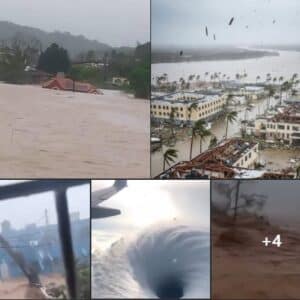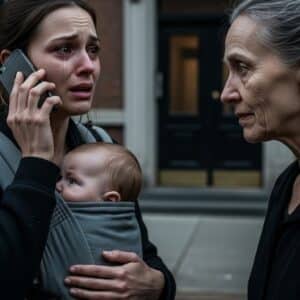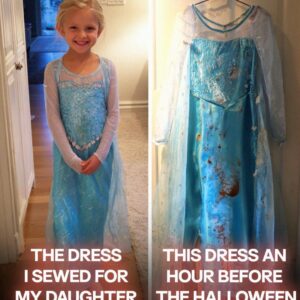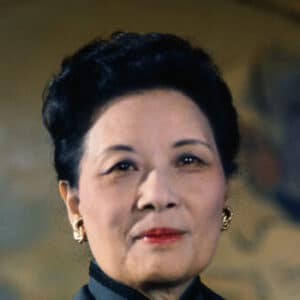Twelve-year-old Leo Morales never expected that one moment of courage would change two lives forever.
The late-afternoon sun blazed over San Aurelio, turning the city’s dust into gold. Along the riverbank walked a barefoot boy with a burlap sack slung over his shoulder. Leo wasn’t looking for trouble—only discarded bottles he could trade for a few coins.
His shirt was torn, his skin darkened by months of outdoor life, his cheeks smudged with dirt. Yet his eyes—deep, black, determined—held a quiet resilience far older than his years.
His grandmother Rosa had always told him, “Being poor isn’t shameful, mijo. Losing your honesty is.” Those words were all he had left of her. Three months had passed since she died, and Leo had survived on park benches, market scraps, and stubborn hope.
The river shimmered lazily in the heat. Leo crouched by the reeds, humming one of Rosa’s lullabies as he reached for a bottle half-buried in mud.
Then—a scream sliced through the air.
He spun around. A crowd had gathered at the bridge. A man in a fine suit thrashed wildly in the muddy water. The current wasn’t strong, but panic drowned faster than rivers.
People shouted.
Others filmed.
No one moved.
Leo didn’t think. He dropped his sack and sprinted toward the riverbank.
“Kid! Stop!” someone yelled.
He didn’t stop. He dove.
The cold water slapped his skin, stealing his breath. He fought forward, stroking hard, until his fingers brushed fabric—smooth, soaked, heavy. The man’s suit dragged both of them down, but Leo kicked furiously, pulling him inch by inch toward the shore.
When they collapsed onto the mud, the man coughed violently, air rasping back into his lungs. His gold watch glinted in the sun. Two men in suits rushed past the crowd, shouting, “Mr. Donovan!”
Leo froze.
Everyone in San Aurelio knew that name—Edward Donovan, the city’s most powerful businessman.
Donovan blinked up at the boy who had just saved his life. “You… you saved me.”
“You were drowning,” Leo said simply.
“What’s your name?”
“Leo Morales.”
The man nodded slowly, as if committing it to memory. “I won’t forget that name.”
Two days later, Leo was helping a fruit vendor unload bananas when a black car rolled up. A driver stepped out.
“Are you Leo Morales? Mr. Donovan would like to speak to you.”
Minutes later Leo stood in a glass-walled office high above the city. Edward Donovan—clean-shaven, polished, composed—smiled warmly and handed him an envelope.
Inside was a full scholarship: tuition, clothes, meals, an apartment. A future.
Leo stared. “Why… why are you doing this?”
Donovan looked out over the skyline, his reflection stretched in the glass.
“Because sometimes,” he said quietly, “it takes a child to remind a man what’s worth living for.”
He paused.
“I wasn’t just drowning in that river, Leo. I was drowning in my life.”
A week later, Donovan spoke publicly about the incident. The city listened in stunned silence.
“My company was collapsing. My marriage had ended. I had built an empire, but somewhere along the way, I lost myself.” His voice shook. “I wasn’t paying attention on that bridge. I didn’t care if I stepped off it. And then… a boy jumped in for me without hesitation. Maybe it wasn’t luck. Maybe it was grace.”
Life changed for Leo overnight.
The Donovan Foundation found him an apartment. Enrolled him in school. Gave him clothes that actually fit. For the first time in years, he slept in a real bed.
He struggled at first—new rules, new classrooms, new expectations—but he learned quickly. Teachers called him bright. Curious. Kind.
When reporters asked about the rescue, Leo only said, “Anyone would have done the same.” But everyone knew—not anyone would.
Months later, Donovan launched a new scholarship fund for underprivileged children. He named it The Rosa Initiative, after Leo’s grandmother.
At the ceremony, Leo stood shyly at the podium and said into the microphone, “My grandma used to say dignity is worth more than money. Now I understand.”
The audience rose in applause.
Donovan placed a hand on the boy’s shoulder. “You saved me, Leo,” he whispered. “Now let’s save others.”
Years passed. The people of San Aurelio never forgot the barefoot boy who leapt into the river.
Leo Morales became the first graduate of The Rosa Initiative. He studied engineering and built affordable homes for families who, like him, had once slept on cold streets.
Sometimes he returned to that quiet bend in the river, watching sunlight ripple across the surface.
“That day,” he would say softly, “I didn’t just save a man. I saved a soul. And he saved mine too.”
In a city that once overlooked him, Leo Morales grew into a symbol of hope—a reminder that courage, even from the humblest hands, can rewrite destiny.





